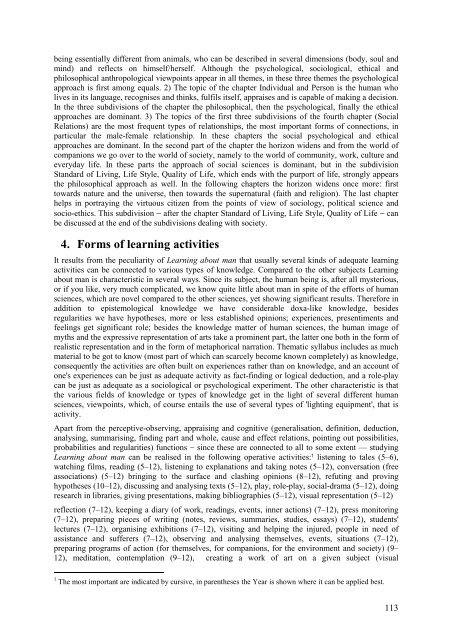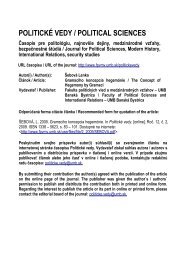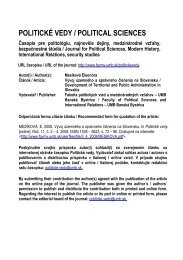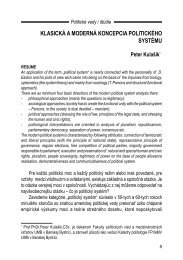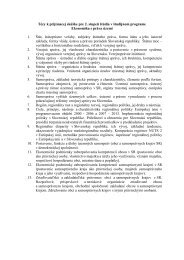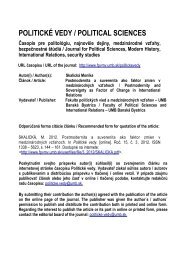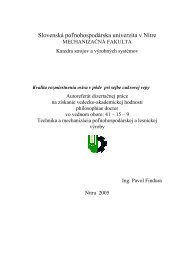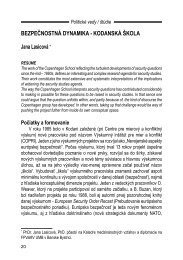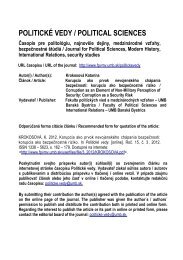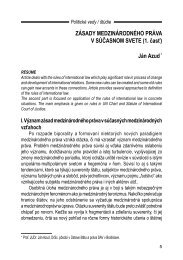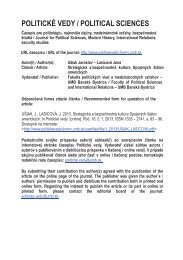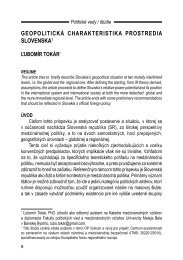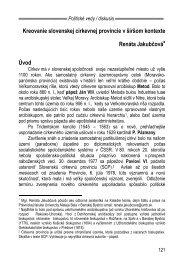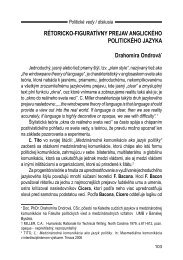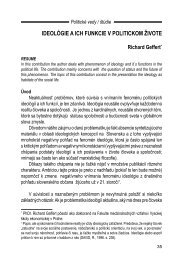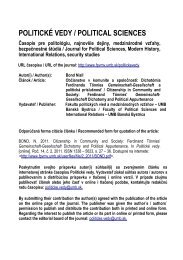MRAVNÃ VÃCHOVA V Å KOLÃCH NA SLOVENSKU A V ZAHRANI ÄÃ
MRAVNÃ VÃCHOVA V Å KOLÃCH NA SLOVENSKU A V ZAHRANI ÄÃ
MRAVNÃ VÃCHOVA V Å KOLÃCH NA SLOVENSKU A V ZAHRANI ÄÃ
Create successful ePaper yourself
Turn your PDF publications into a flip-book with our unique Google optimized e-Paper software.
eing essentially different from animals, who can be described in several dimensions (body, soul and<br />
mind) and reflects on himself/herself. Although the psychological, sociological, ethical and<br />
philosophical anthropological viewpoints appear in all themes, in these three themes the psychological<br />
approach is first among equals. 2) The topic of the chapter Individual and Person is the human who<br />
lives in its language, recognises and thinks, fulfils itself, appraises and is capable of making a decision.<br />
In the three subdivisions of the chapter the philosophical, then the psychological, finally the ethical<br />
approaches are dominant. 3) The topics of the first three subdivisions of the fourth chapter (Social<br />
Relations) are the most frequent types of relationships, the most important forms of connections, in<br />
particular the male-female relationship. In these chapters the social psychological and ethical<br />
approaches are dominant. In the second part of the chapter the horizon widens and from the world of<br />
companions we go over to the world of society, namely to the world of community, work, culture and<br />
everyday life. In these parts the approach of social sciences is dominant, but in the subdivision<br />
Standard of Living, Life Style, Quality of Life, which ends with the purport of life, strongly appears<br />
the philosophical approach as well. In the following chapters the horizon widens once more: first<br />
towards nature and the universe, then towards the supernatural (faith and religion). The last chapter<br />
helps in portraying the virtuous citizen from the points of view of sociology, political science and<br />
socio-ethics. This subdivision − after the chapter Standard of Living, Life Style, Quality of Life − can<br />
be discussed at the end of the subdivisions dealing with society.<br />
4. Forms of learning activities<br />
It results from the peculiarity of Learning about man that usually several kinds of adequate learning<br />
activities can be connected to various types of knowledge. Compared to the other subjects Learning<br />
about man is characteristic in several ways. Since its subject, the human being is, after all mysterious,<br />
or if you like, very much complicated, we know quite little about man in spite of the efforts of human<br />
sciences, which are novel compared to the other sciences, yet showing significant results. Therefore in<br />
addition to epistemological knowledge we have considerable doxa-like knowledge, besides<br />
regularities we have hypotheses, more or less established opinions; experiences, presentiments and<br />
feelings get significant role; besides the knowledge matter of human sciences, the human image of<br />
myths and the expressive representation of arts take a prominent part, the latter one both in the form of<br />
realistic representation and in the form of metaphorical narration. Thematic syllabus includes as much<br />
material to be got to know (most part of which can scarcely become known completely) as knowledge,<br />
consequently the activities are often built on experiences rather than on knowledge, and an account of<br />
one's experiences can be just as adequate activity as fact-finding or logical deduction, and a role-play<br />
can be just as adequate as a sociological or psychological experiment. The other characteristic is that<br />
the various fields of knowledge or types of knowledge get in the light of several different human<br />
sciences, viewpoints, which, of course entails the use of several types of 'lighting equipment', that is<br />
activity.<br />
Apart from the perceptive-observing, appraising and cognitive (generalisation, definition, deduction,<br />
analysing, summarising, finding part and whole, cause and effect relations, pointing out possibilities,<br />
probabilities and regularities) functions − since these are connected to all to some extent — studying<br />
Learning about man can be realised in the following operative activities: 1 listening to tales (5–6),<br />
watching films, reading (5–12), listening to explanations and taking notes (5–12), conversation (free<br />
associations) (5–12) bringing to the surface and clashing opinions (8–12), refuting and proving<br />
hypotheses (10–12), discussing and analysing texts (5–12), play, role-play, social-drama (5–12), doing<br />
research in libraries, giving presentations, making bibliographies (5–12), visual representation (5–12)<br />
reflection (7–12), keeping a diary (of work, readings, events, inner actions) (7–12), press monitoring<br />
(7–12), preparing pieces of writing (notes, reviews, summaries, studies, essays) (7–12), students'<br />
lectures (7–12), organising exhibitions (7–12), visiting and helping the injured, people in need of<br />
assistance and sufferers (7–12), observing and analysing themselves, events, situations (7–12),<br />
preparing programs of action (for themselves, for companions, for the environment and society) (9–<br />
12), meditation, contemplation (9–12), creating a work of art on a given subject (visual<br />
1 The most important are indicated by cursive, in parentheses the Year is shown where it can be applied best.<br />
113


